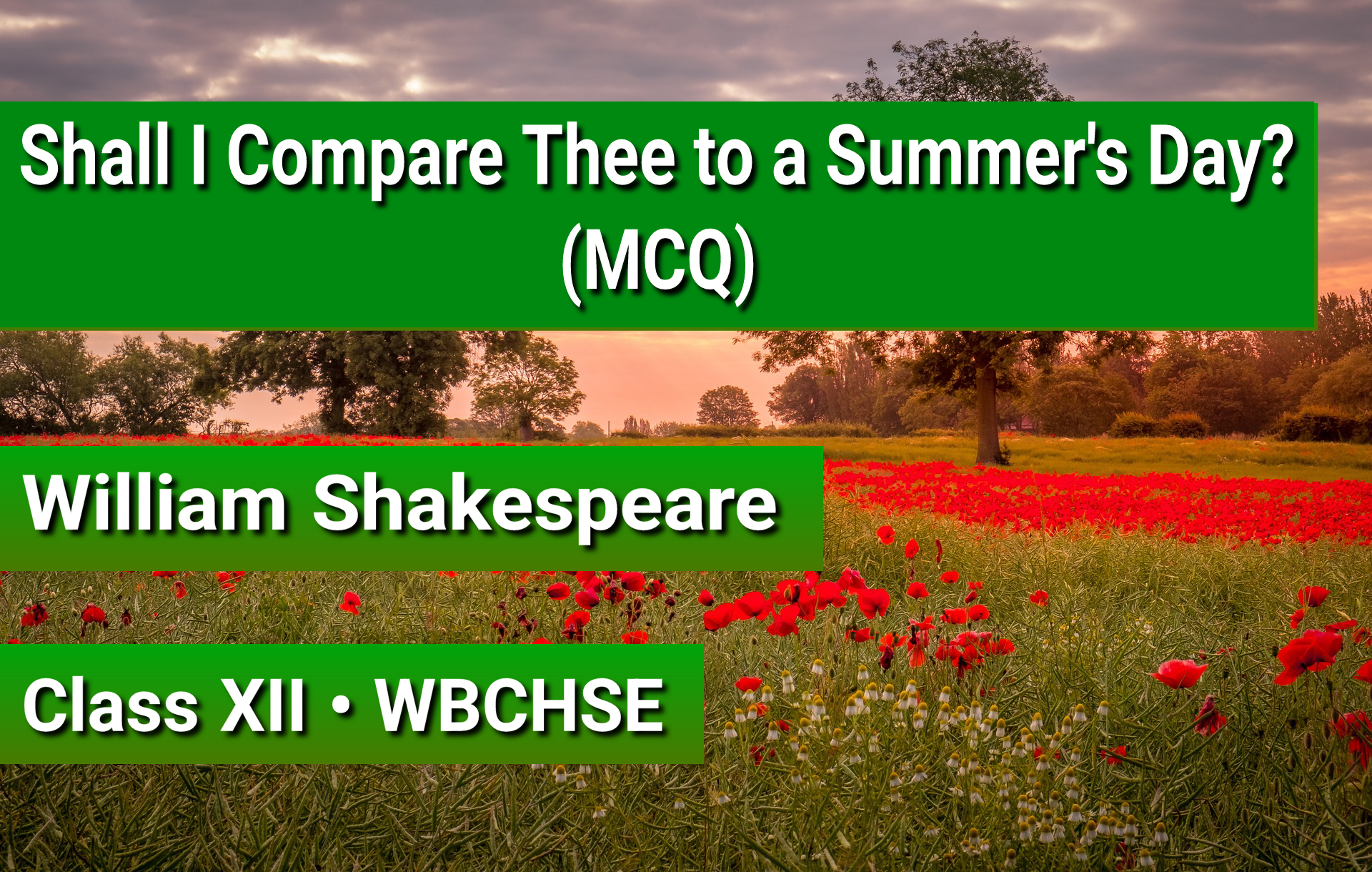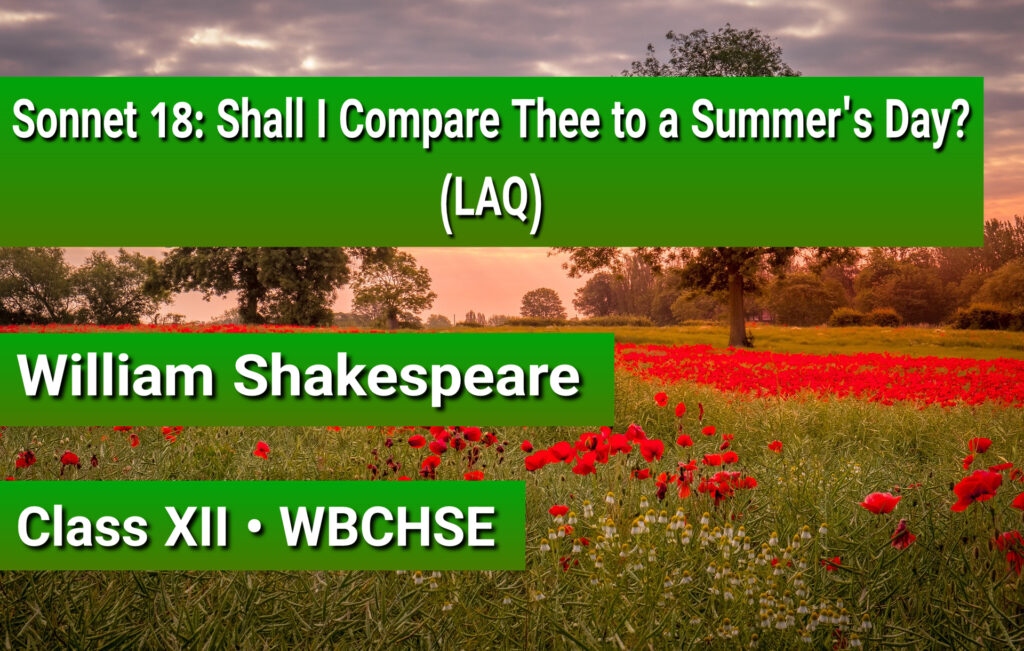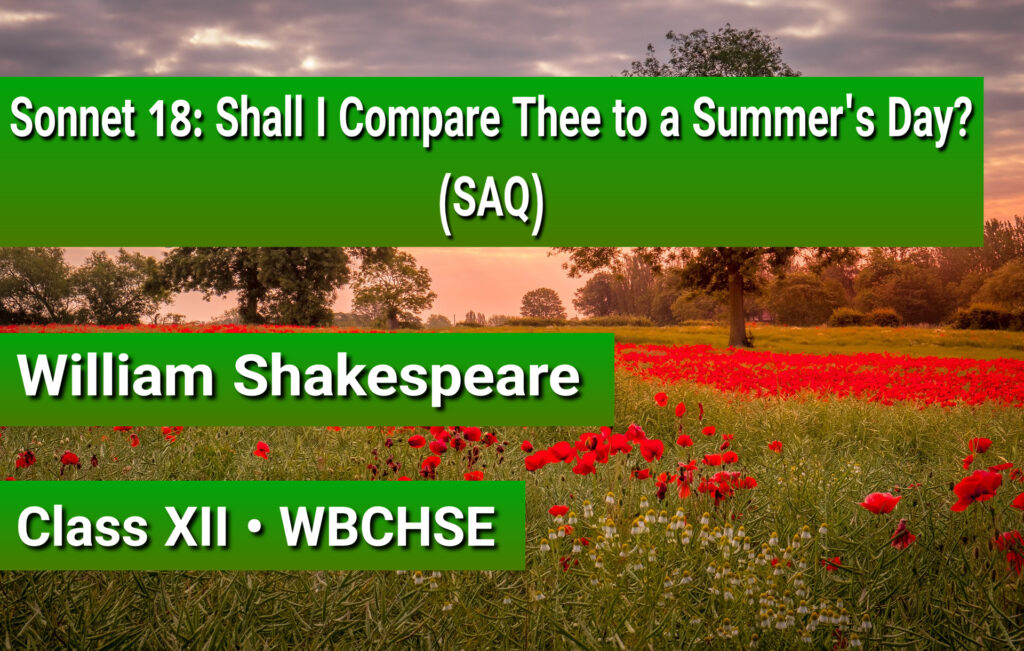
Sonnet No 18 – Shall I Compare Thee to a Summer’s Day by William Shakespeare
Shall I Compare Thee to a Summer’s Day MCQ
Shall I Compare Thee to a Summer’s Day Questions and Answers
- Shall I compare thee to a summer’s day? Is Sonnet no.-
a. 16
b. 17
c. 18
d. 19
Ans. C
- The word ‘temperate’ means-
a. Warm
b. Moderate
c. Friendly
d. Temporary
Ans. B
- The theme that Shakespeare explores in Sonnet 18 is-
a. Immortality of youth and beauty
b. Carpe diem
c. Death as an agent of nature
d. Timelessness of poetry
Ans. A
- Who is the sonnet addressed to-
a. Shakespeare’s wife
b. Queen Elizabeth
c. A young woman
d. A young man
Ans. D
- The poet compares his beloved to-
a. A summer flower
b. Summer breeze
c. A summer’s day
d. Summer tune
Ans. C
- Compared to a summer’s day, the poet’s friend is-
a. more lovely and temperate
b. more sweet and soothing
c. more attractive and beautiful
d. more sensuous and passionate
Ans. A
- The poet states that ‘fair’-
a. Is subject to change
b. Is the opposite of unfair
c. Can only diminish marginally
d. Is never subject to change
Ans. A
- Nature’s changing course is-
a. Dimmed
b. Temperate
c. Untrimmed
d. Lovely
Ans. C
- ‘But thy eternal summer shall not fade’. The word opposite in meaning to ‘eternal’ is-
a. Universal
b. Momentary
c. Temporal
d. Decayed
Ans. A
- Whose eternal summer shall not fade?
a. Shakespeare’s
b. The fair youth
c. The black lady
d. Queen Elizabeth
Ans. B
- The poet asserts that his friend will never lose possession of his-
a. Property
b. Health
c. Beauty
d. Wealth
Ans. C
- ‘Nor shall death brag thou wand ‘rest in his shade,’- here ‘shade’ refers to-
a. Talk loudly
b. Talk cheerfully
c. Claim boastfully
d. Take away
Ans. C
- The rough winds of summer-
a. Blow the flowers away
b. Shake the darling buds of May
c. Prevent the birds to fly
d. Blow a beautiful scene
Ans. B
- Summer has-
a. Short duration
b. Long duration
c. Constant temperature
d. Constant brightness
Ans. A
- ‘The eye of heaven’ in Shakespeare’s Sonnet No 18 refers to-
a. The sun
b. The moon
c. The poet
d. The clouds
Ans. A
- How is the gold complexion of the sun dimmed-
a. By the clouds
b. By the shade of the tree
c. By a canopy
d. By the shade of a building
Ans. A
- Death in the poem is personified as-
a. Kind and helpful
b. Sweet and smart
c. Calm and quiet
d. Proud and boastful
Ams. D
- The poet’s friend is expected to grow-
a. With time
b. With the eternal lines of the poem
c. With the love of the poet
d. With nature’s changing course
Ans. B
- How can eternal summer be maintained?
a. Through poem
b. Through beauty
c. Through preservation
d. Through conservation
Ans. A
- What is the controlling simile in the poem?
a) summers day
b) eternal summer
c) clouds
d) flowers.
Ans. A
- “Thou art more lovely and more temperate.” The word ‘thou’ refers to –
a) the poet’s ladylove
b) the poet’s friend
c) the poet’s mother
d) the poet himself.
Ans. B
- The word ‘temperate’ means
a) temporary
b) warm
c) friendly
d) moderate.
Ans. D
- The fair youth’s beauty surpasses the beauty of
a) nature
b) Summer
c) Autumn
d) winter
Ans. B
- The poet compares his beloved to a-
a) wintry day
b) summer’s day
c) sunny day.
d) spring day
Ans. B
- The winds that blow in summer in Shakespeare’s Sonnet No. 18 are
a) warm
b) balmy
c) rough
d) slow.
Ans. C
- Buds of May are –
a) darling
b) tender
c) beautiful
d) green.
Ans. A
- What kind of complexion does the sun have?
a) golden
b) yellow
c) blue
d) red.
Ans. A
- Shakespeare’s young friend is more lovely and temperate than the
a) buds of May
b) eye of heaven
c) rough winds
d) Summer’s day.
Ans. D
- The expression ‘summers lease’ is suggestive of –
a) the brevity of the summer
b) the eternal presence of summer
c) the sporadic presence of summer
d) the silence of summer.
Ans. C
- The poet states that summer –
a) is not eternal
b) is hot and humid
c) is eternal
d) is constant.
Ans. A
- “Sometime too hot the eye of heaven shines.” – The reference here is to –
a. the Mars
b. the Sun
c. the Moon
d. Jupiter.
Ans. B
- Rough winds in Summer days destroy
a. flowers
b. buds
c. trees
d. fruits.
Ans. B
- The “darling buds” are shaken by rough winds in –
a. March
b. April
c. May
d. June.
Ans. C
- Whose “gold Complexion” becomes dimmed sometime? –
a. the friend’s
b. the sun’s
c. nature’s
d. the poet’s.
Ans. B
- How is the gold-complexion of the sun dimmed?
a. by a canopy
b. by the clouds
c. by the trees
d. by the shade.
Ans. B
- The poet states that fair –
a. is subject to change
b. is the opposite of unfair
c. can only diminish marginally
d. is never subject to change.
Ans. A
- The eye of heaven in Shakespeare’s Sonnet No. 18 refers to –
a. the sun
b. the moon
c. the poet
d. the clouds.
Ans. A
- “But thy eternal summer shall not fade.” – The opposite word of ‘eternal’ is
a. decayed.
b. universal
c. momentary
d. temporal
Ans. C
- Nature’s changing course is –
a. dimmed
b. temperate
c. untrimmed
d. lovely.
Ans. C
*****
Read More:
WBCHSE Class 12 English POETRY Chapter Wise Questions and answers
Sonnet No 18 “Shall I compare Thee to a Summer’s Day?” SAQ Short Questions and Answers



